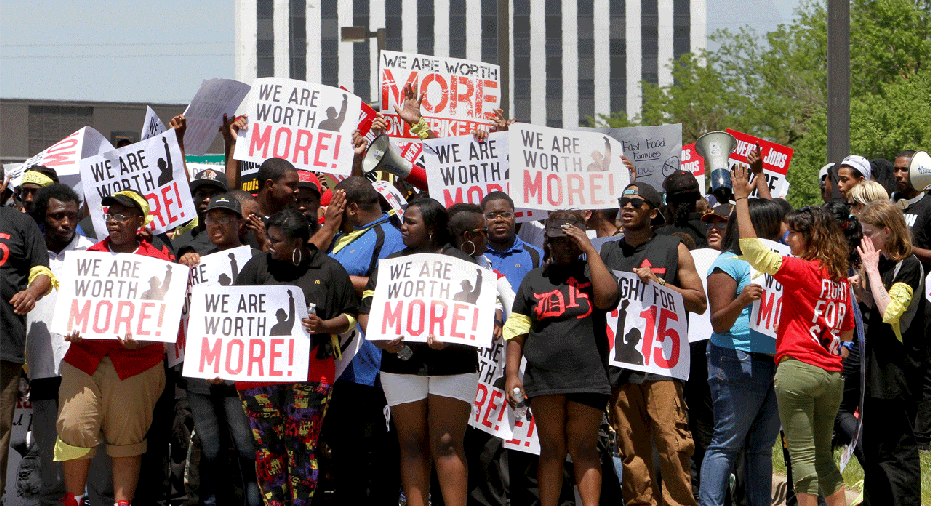Fight for 15 gets political with strike, campaign aimed at booting Republican governors

The national campaign to raise the federal minimum wage to $15 per hour – the Fight for 15 – is hosting a strike over Labor Day weekend, as the movement shifts gears toward winning back Midwestern states from the GOP in upcoming elections.
“The number one job of politicians is to raise the standard of living for workers,” the Fight for 15’s strike invitation reads. “But in states across the country, Republican governors are doing the opposite – using their power to do everything they can to help corporations and billionaires at the expense of the rest of us … In 2018, the worst Republican governors – ones in battleground states – are ALL up for reelection. Let’s throw ‘em out.”
Michael Saltsman, managing director at the Employment Policy Institute, views the Fight for 15’s current push less as an extension of its original mission – when 200 fast-food workers walked off the job demanding higher pay and union rights in 2012 – and more as a redirection of its effort.
“It all feels much more like a ‘get out the vote’ push than a union organizing campaign,” Saltsman said. “I think that given the amount of money that the union [SEIU] has spent on this ... they’re looking at 2018 and saying ‘how do we most effectively spend our money to try and advance our agenda.’”
Meanwhile, others don’t see it necessarily as a redirection, but more as an adaptation of strategy: Without politicians backing the idea, a federally mandated $15 minimum wage is less viable.
“[The Fight for 15 is] increasingly recognizing a solution to both [$15 minimum wage and unionization] is not just through direct engagement through employers, but it also needs to have a political solution,” David Madland, senior fellow at the Center for American Progress, told FOX Business.
The Fight for 15 said the goal of its new push is to help elect politicians who share its same core goals. The group declined to elaborate further when contacted by FOX Business.
As Madland pointed out, Democrats lost in some traditionally labor-focused states in the last election because President Donald Trump’s message was one of concern for workers.
“There was an opening that politicians have for way too long ignored in the [form of the] working class,” he said, adding he doesn’t believe Trump’s actions have measured up to his rhetoric.
So far this year, the Fight for 15 has seen a significant drop-off in activity when compared with recent years. While workers went on strike in more than 600 cities across the United States in 2016, protests have occurred in just 30 cities throughout the first seven months of 2017, according to an analysis by the Employment Policy Institute – a think tank that opposes the movement to raise the federal minimum wage. The national reach of the group’s sponsored strikes are at the lowest rate since 2013, when they occurred in 60 U.S. cities.
Saltsman doesn’t see $15 minimum wage becoming an issue that pushes Democratic candidates to victory throughout the major upcoming election cycles.
“They don’t even have unified Democratic support for a $15 minimum wage. It’s pretty clear that they want ‘15’ as an issue to campaign on,” he said.
The minimum wage debate caused divisions within the Democratic Party during the 2016 election cycle, with Sen. Bernie Sanders (I-Vt.) pushing for a 15 minimum wage, while Hillary Clinton appeared to waffle between $12 and $15.
Republicans, on the other hand, have argued that increasing the federal minimum wage could drive down hiring incentives and result in a loss of job opportunities.
While Madland believes $15 minimum wage will factor into the upcoming elections, he says overall wage growth will ultimately be the bigger priority for voters.
The Fight for 15's Labor Day strike is expected to involve fast-food workers in more than 300 cities.



















